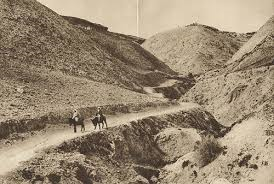When Marco’s father Ephraim first came to Nazareth, people were very suspicious of him. Samaritans, we had always been told by our Rabbis, are the enemies of the Israelites. They believe that they are also Jews, like us, but many generations ago, while our ancestors were in exile in Babylon, their ancestors managed to remain in Israel, living on Mount Gerazim. They believe their place of worship on Mount Gerazim should be the centre of Jewish worship, while we believe that the Temple in Jerusalem should be the centre of the worship of Yahweh. The way Samaritans were talked about they might have had two heads or a little devils tail; and all over a place of worship.
Ephraim rode in on a donkey, with a servant on a second, leading a third loaded with panniers of merchandise to sell. It was always an event when a travelling merchant arrived, and many of the locals came down to the market place, to see what he had for sale. Their curiosity about the wares he had for sale far outweighed any suspicions they might have had about him. He must have done well out of the people of Nazareth, for he paid handsomely to stay in the house of Joseph the Carpenter, and to stable his animals with Joseph’s. When Joseph was asked about him the next day, all he would say was that he was very polite, and that he hadn’t seen a horn or a tail. He looked just like anyone else. Joseph seemed to like him, and if Joseph liked him, then he was probably alright. Ephraim made himself popular by going around all of the craftsmen in the village, and examining their wares. He bought quite a bit, and commissioned more, on which he put down a deposit. He said that he would be back in a few weeks to collect his goods. When he set off again, many of the villagers were sad to see him go.
Over the next few years he would regularly come to Nazareth, and stay increasingly long periods of time, as he roamed far and wide around the countryside looking for new artisans from whom he could buy and commission goods. He continued to stay with Joseph, until he eventually asked the village elders whether he could buy some land and build himself a house. When they agreed, he bought a plot of land on the edge of the market place, and set about hiring labourers to build him a stone house. He commissioned a wooden door with metal hinges from Joseph the carpenter and Simeon the smith. When the house was ready he moved in. A little while later a young man came riding into Nazareth. He looked rather familiar, and when he asked for the house of Ephraim, the village gossips went into overdrive, speculating who he might be. That evening Ephraim opened the doors of his house, and invited the village in to eat and drink, and to meet his son Marco. Ephraim’s house was thoroughly inspected, and provided a wonderful source of gossip for many days. Eventually some other scandal overtook the subject of Ephraim’s house, and he and his son were able to get on with their lives in peace.
One thing that he hadn’t explained was his son’s name. Marco is not a Samaritan name it is Roman. Marco’s mother was not in evidence, so maybe, the village gossips thought, she was Roman. Eventually one evening sitting on the roof of Joseph’s house, with a small group of his friends around him Ephraim told them the story of how, when he was an impetuous youth, he had set out along the Silk Road determined to make his fortune. He only got a few miles from home when he was set upon by robbers who beat him and stripped him and left him to die beside the road. Just as he was giving up all hope of being rescued, a couple of Roman soldiers spotted him, picked him up and carried him to the nearest inn. They innkeeper recognised him, and sent for his family who came and collected him, and took him home to nurse him back to health. In gratitude for saving his life, Ephraim promised to name his first two sons after his rescuers. His wife had died giving birth to Marco, so he had been spared having to call a second son Vicus. His family had been furious about the name, but his wife had understood, and so Marco was named. As it turned out, having a Roman name when you trade a lot with the Romans was no handicap.

